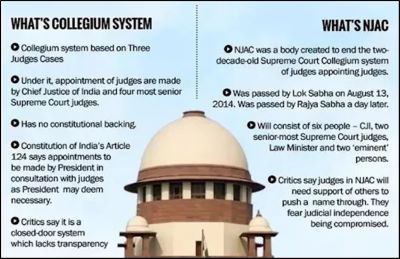Context-
Judges are the ultimate authority in the interpretation of the Constitution of India, making it imperative that they are both learned in the law and possess an understanding of the broader cultural context. However, the process by which judges are selected, and the criteria used to evaluate their qualifications, remain subjects of significant debate.
Balancing Independence and Accountability
The Constitution of India creates a harmonious balance between the executive, the legislature, and the judiciary. Yet, for the judiciary to effectively uphold democratic values, it must operate with a high degree of independence. However, such independence must be tempered by constitutional discipline and accountability, lest it devolve into arrogance.
● The Need for Judicial Independence
The need for judicial independence is clear. As the third pillar of democracy, the judiciary must remain free from external pressures. However, Chief Justice S.H. Kapadia once remarked that judicial independence should not be exercised in isolation from accountability. This view echoes the concerns of Law Minister Salman Khurshid, who emphasized the importance of judicial propriety.
● Separation of Powers and Accountability
The Constitution, through its separation of powers, creates a functional balance between the three branches of government. The executive implements laws, the legislature enacts them, and the judiciary ensures that both the executive and legislative actions align with constitutional principles.
● Maintaining Balance for Democratic Integrity
This delicate balance is critical for democracy. While the judiciary has the power to issue directions under Article 143 to correct any unconstitutional or arbitrary actions by the other branches, it must also function within the constitutional framework. Accountability measures ensure that judges do not misuse their independence or act outside the bounds of propriety..
Criticism and the Role of Judges
● Felix Frankfurter's Perspective on Judicial Accountability
The American jurist Felix Frankfurter once observed that judges, like all public officials, should not be immune to criticism. He cautioned that judges may sometimes forget their limitations and responsibilities, especially when cloaked in the power of their office. Frankfurter’s remarks serve as a reminder that judicial authority must always be exercised with humility and respect for the law.
● Judicial Power and Accountability in a Democracy
Judges wield immense power as interpreters of the Constitution and must be mindful of their fallibilities and biases. This is particularly relevant in a democracy like India, where the judiciary holds significant power in safeguarding fundamental rights and ensuring justice.
● Concerns Regarding Judicial Appointments
While judges are the ultimate interpreters of the Constitution, the method of their appointment raises serious concerns about transparency, accountability, and class bias.
The Problem with Judicial Appointments
● Current System of Appointments
The process of judicial appointments is of critical importance, as it directly affects the functioning of the judiciary. Under the current system, the President of India appoints judges. However, in reality, these appointments are based on decisions made by the Cabinet. This method raises questions about the true independence of the judiciary.
The Preamble to the Constitution lays out the fundamental values of justice, liberty, equality, and fraternity, which the judiciary is meant to uphold. Yet, the process by which judges are selected does not always reflect these ideals. There is a growing concern that judges are often drawn from a narrow section of society, and the process of selection lacks transparency.
Class Bias and the Role of the Collegium
● Class Bias in Judicial Appointments
One of the most significant issues with judicial appointments in India is the potential for class bias. The Constitution promises a socialist, secular, democratic republic, but in practice, many judges come from privileged backgrounds. Winston Churchill once observed that while courts in Britain commanded respect in criminal and civil cases, they were often perceived as biased in matters involving class issues. The same criticism applies to India’s judiciary.
● Introduction of the Collegium System
The introduction of the collegium system for judicial appointments only deepened this concern. The collegium system, established by a narrow 5-4 majority in the Supreme Court, allows judges to select other judges without any formal structure for public input or scrutiny. While the collegium system was intended to preserve judicial independence, it has been criticized for lacking transparency and accountability. There are no clear principles guiding the selection of judges, nor is there any investigation into their backgrounds or potential biases.

The Need for Reform:
● The Case for a Judicial Commission
In light of the shortcomings of the collegium system, there have been growing calls for reform. The Union Law Minister has proposed replacing the collegium with a judicial commission that would oversee the appointment of judges. However, this proposal raises important questions: How should the commission be structured? To whom would it be accountable? What principles should guide its decision-making?
To ensure the independence and integrity of the judiciary, any judicial commission must be of the highest standing. It should be chaired by the Chief Justice of India and consist of individuals with a stature comparable to that of Supreme Court judges or the Prime Minister. Importantly, the commission must be insulated from political influence and corporate pressures, operating independently to uphold the values enshrined in the Constitution.
● Ensuring Transparency and Public Involvement
A key aspect of judicial reform must involve greater transparency in the appointment process. Currently, the collegium operates in a manner that is opaque and unaccountable. There is no opportunity for public input or scrutiny, and the process lacks any formal mechanism for investigating the qualifications or biases of potential judges.
A judicial commission should address these concerns by incorporating mechanisms for public involvement. For instance, the public should have the opportunity to raise concerns about potential appointees, and these concerns should be thoroughly investigated by an independent agency. Importantly, such investigations should not be conducted by the police, who are under government control, but by an independent body that answers only to the commission.
● Maintaining Judicial Independence
While accountability is critical, it is equally important to ensure that the judiciary remains independent. Any judicial commission must operate free from political interference and be protected from legal challenges. Its members should be immune from civil and criminal proceedings, and the commission itself should only be removable by a tribunal consisting of the Chief Justices of the Supreme Court and the High Courts.
This level of protection is necessary to ensure that the commission can carry out its work without fear or favor. Only by maintaining such independence can the judiciary fulfill its role as the guardian of the Constitution.
Conclusion
The process of appointing judges in India is in need of urgent reform. The current system, dominated by the collegium, lacks transparency, accountability, and public involvement. To address these issues, a judicial commission should be established that is independent, transparent, and accountable to the public.
Such reforms are essential to ensure that the judiciary can continue to function as a pillar of democracy, upholding the values enshrined in the Constitution and safeguarding the rights of all citizens. Only by addressing these fundamental concerns can the judiciary truly serve the people of India with integrity, impartiality, and independence.
|
Probable Questions for UPSC Mains Exam- 1. "Discuss the significance of judicial independence in India and examine how the current system of judicial appointments affects the transparency and accountability of the judiciary." (10 marks, 150 Words ) 2. "Critically evaluate the collegium system of judicial appointments in India. Should it be replaced with a judicial commission? Justify your answer with relevant arguments." (15 Marks, 250 Words) ). |
Source- The Hindu








